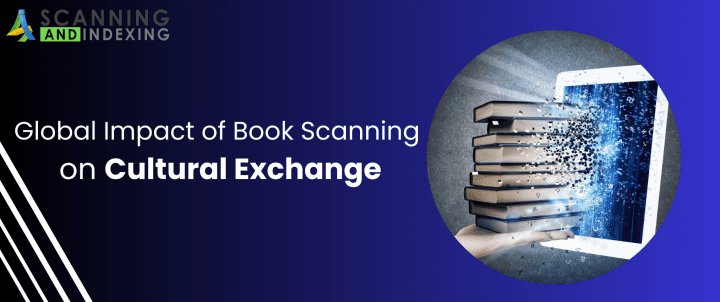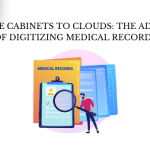Shrinking the World: Global Impact of Book Scanning on Cultural Exchange
Idea and Impact of Book Scanning
Literature and books are portals that have the magic to open gateways of creativity and realms of wonder! Poems, novels, short stories, astrophysics, basically anything we’ve learned, the influence of books has been paramount. There are centuries-old manuscripts, prayer books, and ancient literature books that are considered prized possessions or treasures.
Technological innovations and advancements are transforming our daily lives in all aspects. Book scanning is the process of converting physical documents into digital format. In simpler words, transforming papers into digital formats such as E-books, PDFs, or ePub.
Book scanning is a complex procedure that uses high-end software and machinery to convert physical documents into digital formats. This process enables the content to reach a wider audience without stressing extra costs and care. Image a vast library that you can literally hold in your fingerprints! Isn’t it cool? You no longer have to ask for directions, find columns and rows, or yell at the bookkeeper. You can store all that information and data inside a 2-inch chip or a device that you can literally carry in your pocket. Anyway, let’s dive into the concept and impacts of book scanning services.

Scanning and indexing of books has become one of the most demanded services since the outbreak of the pandemic. Businesses of many sectors depend on scanning services; some of the sectors include;
- Libraries
- Publishers
- Research academies
- Cultural Heritage Institutions
- Government and Legal
- Corporate and Business
- Non-profit Organizations
Book Scanning and Education
Book scanning services play a pivotal role in education. Digitizing textbooks and study materials simplifies the learning process by making it more fun and more personal. However, let’s see how book scanning impacts learning.
Integration of digital resources in classrooms
Smart classrooms powered by digital boards and speakers have made learning more fun. Digital resources such as textbooks, diagrams, media, and reference materials have enabled both teachers and students to enjoy classes in a fun atmosphere. Digitizing books and educational content enabled organizations to seamlessly incorporate digital content into teaching practices.
This integration has powered classrooms by bringing multimedia-rich content that fosters curiosity and understanding to another league. Moreover, digital data facilitates customization, collaboration, updates, and sharing. Physical books and papers have their limitations when it comes to edits, updates, and multiple access. So, book digitization empowers educational organizations to create an ideal environment for learners that fosters collaboration, creativity, and intelligence.
Access to educational materials in remote areas
Remote areas and underdeveloped countries have inadequate educational systems due to the lack of funding and provisions. For educational organizations and small-scale training centers, digital classrooms may not be possible due to their location, infrastructure, or other provisions. However, proper Paper Data digitization enables them to eliminate geographical barriers and gain access and connect every day.
Digital copies and materials allow learners to access, edit, and share without any hassles. You can use and share Kindle versions and electronic books no matter where you are from. You can just learn your craft with digital materials, just like in urban or developed regions.
Challenges in educational book scanning
Copyright and Intellectual Property and copyright concerns: There are copyright laws and permissions that have to be cleared before making a duplicate form. This procedure has to do a lot of documentation and paperwork to ensure compliance. So, the copyright issue is a risky task for book digitization.
Quality issues: Scanning books that have diagrams and images is not a simple process. Minor inaccuracies can lead to a whole new story without students even not knowing. So, make sure to use high-end devices and software for accurate copies.
Fragile or Damaged Books: Books that have poor binding and damage will be challenging as they may not be applicable to be scanned and require careful handling to avoid further damage.
Metadata and preservation: Digital data should be organized and stored with accurate metadata for efficient retrieval and digital preservation. To ensure long-term preservation and accessibility of digitized materials, we need top-end security provisions and infrastructure.
What drives businesses from different sectors to rely on book scanning services?
- Enhanced Document Management: Digitizing books and physical materials enables businesses to keep a well-organized database system. Digital copies are easy to search, find, retrieve, and share compared to physical documents. Physical documents streamline databases, digitizing books and documents, businesses can streamline their document management processes. Digital copies are easier for management to organize, search, and retrieve, reducing the time and effort spent on manual document handling.
- Improved Accessibility and Collaboration: Digital content is easier to access, edit, and share compared to manual copies. Digitized work fosters collaboration, as anybody can work on the same file at the same time. With manual books and paper documents, only one person can use them at that time. Moreover, you can access needed data from anywhere as long as you’re connected to the network.
- Cost and Space: Physical books and documents need a lot of space and attention in office spaces. Dusty tables and cabinets make you feel like you’re in the middle of a stressed environment and are so outdated. So, it’s a tiring process to manually organize books here and there. By digitizing books and documents, businesses can reduce storage costs and expenses quickly.
- Increased Security and Disaster Recovery: Digital contents are less susceptible to wear, tear, and damage. Physical copies are prone to theft and misuse. Implementing robust security measures in place can easily protect digital assets. Security systems such as passwords, encryptions, and firewalls prevent fraudulent activities from happening. Moreover, digital documents can be retrieved if lost, you can use backup and recovery applications.
- Audit-friendly: Digital copies of books or materials are very easy to index and tag. So, when an audit takes place, you can effortlessly search or retrieve specific information from a huge set of data. In addition, books and pages need lots of time and attention to carry out audits. A database of digitized data complies with audits compared to physical books and documents.
- Legal Compliance: Scanned files and books ensure the highest standard of work. With a digitalized storage system, organizations can maintain an accurate workflow that adheres to legal compliance and statutory regulations. Moreover, scanned and digitized data can be regularly updated, reducing the risk of non-compliance due to outdated practices and procedures.
- Environment friendly: Digitization of physical documents contributes to a greener world. Digitization and scanning reduce the amount of trees that have to be cut down for paper production. Digitization supports social responsibility goals and commitment by minimizing the waste generation of manual papers and disposal of books. This method promotes accurate information management and team collaboration.
- Flexibility and Adaptability: Digital data are flexible to adapt to changing business needs quickly. Digitalized documents can seamlessly integrate with other portals, tools, and software, unlike manual paperweights and books. Integration of effective CRMs and ERP enables businesses to maintain a streamlined database management system. So, they can be quickly revised, modified, and updated when you’re planning to bring new changes according to fresh business strategies.
Conclusion
In conclusion, book scanning and digitization have a profound impact on both cultural and business aspects. With an expert book conversion service provider, businesses and individuals can break the barriers of time, distance, and language. The digitization of books enables individuals from diverse backgrounds to learn and share ideas in a more transparent way! We are one of the leading book digitization services that provide a broad range of services in scanning and indexing services. Do reach us via mail at [email protected] for queries and services.





